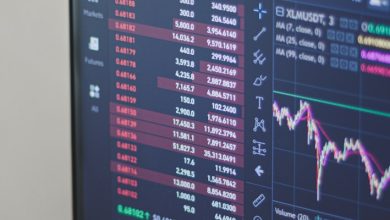The Role of NFTs in Expanding DeFi Use Cases

- Understanding the intersection of NFTs and DeFi
- Exploring the potential of NFTs to revolutionize DeFi
- How NFTs are changing the landscape of DeFi use cases
- Unlocking new opportunities for DeFi through NFT integration
- The growing importance of NFTs in the DeFi ecosystem
- Case studies showcasing the power of NFTs in DeFi applications
Understanding the intersection of NFTs and DeFi
Understanding the intersection of Non-Fungible Tokens (NFTs) and Decentralized Finance (DeFi) is crucial in exploring the potential for expanding DeFi use cases. NFTs have gained significant popularity in recent years as unique digital assets that represent ownership of specific items or pieces of content. On the other hand, DeFi has revolutionized traditional finance by providing decentralized alternatives to traditional financial services.
When NFTs and DeFi come together, they create new opportunities for innovation and growth in the blockchain space. NFTs can be used as collateral in DeFi platforms, allowing users to leverage their digital assets to access liquidity and participate in various financial activities. This integration opens up possibilities for new forms of lending, borrowing, and trading that were previously not possible.
Furthermore, NFTs can also be used to tokenize real-world assets such as art, real estate, and collectibles, making them easily tradable on DeFi platforms. This tokenization process enables fractional ownership of assets, allowing more people to invest in high-value assets that were once out of reach. By combining NFTs with DeFi, users can unlock the value of illiquid assets and create new markets for trading and investment.
Exploring the potential of NFTs to revolutionize DeFi
Exploring the potential of Non-Fungible Tokens (NFTs) to transform Decentralized Finance (DeFi) opens up new possibilities for expanding the use cases of blockchain technology. NFTs represent unique digital assets that can be tokenized to create verifiable ownership on the blockchain. By integrating NFTs into DeFi platforms, users can leverage these digital assets as collateral for borrowing and lending purposes.
One of the key advantages of using NFTs in DeFi is their ability to unlock liquidity for illiquid assets. By tokenizing real-world assets such as art, real estate, or collectibles, users can fractionalize ownership and trade these assets on decentralized exchanges. This opens up new investment opportunities for users, allowing them to diversify their portfolios beyond traditional financial instruments.
Furthermore, by combining NFTs with DeFi protocols, developers can create innovative financial products such as NFT-backed loans, insurance, and prediction markets. These new use cases not only expand the DeFi ecosystem but also bring more mainstream adoption to blockchain technology. As more users interact with NFTs in DeFi, the potential for growth and innovation in the space becomes limitless.
How NFTs are changing the landscape of DeFi use cases
NFTs have opened up a world of possibilities for DeFi platforms, expanding their use cases beyond traditional financial instruments. Non-fungible tokens allow for the creation and trade of unique digital assets, which can represent anything from art and collectibles to real estate and intellectual property.
One of the key ways in which NFTs are changing the landscape of DeFi use cases is through the creation of new investment opportunities. By tokenizing real-world assets as NFTs, investors can now access a wider range of assets that were previously illiquid or difficult to trade.
Furthermore, NFTs are also being used to collateralize loans in DeFi platforms, providing users with an alternative form of collateral that can be more easily verified and valued. This opens up new avenues for borrowing and lending within the DeFi space, creating more flexibility for users.
Overall, the integration of NFTs into DeFi platforms is revolutionizing the way in which digital assets are created, traded, and used within the decentralized finance ecosystem. As the technology continues to evolve, we can expect to see even more innovative use cases emerge, further blurring the lines between the physical and digital worlds.
Unlocking new opportunities for DeFi through NFT integration
The integration of Non-Fungible Tokens (NFTs) into the Decentralized Finance (DeFi) ecosystem opens up a world of new possibilities and opportunities for users and developers alike. By combining the unique properties of NFTs with the innovative capabilities of DeFi, we can unlock a whole new level of financial creativity and flexibility.
NFTs have the potential to revolutionize the way we think about assets and ownership. With NFT integration, DeFi platforms can offer users the ability to tokenize real-world assets, such as art, real estate, or even intellectual property. This opens up a whole new world of investment opportunities and allows for greater diversification and risk management.
Furthermore, NFTs can also be used as collateral in DeFi lending and borrowing protocols. This means that users can leverage their NFT holdings to access liquidity without having to sell their assets. This opens up new avenues for capital efficiency and allows users to unlock the value of their NFTs while still retaining ownership.
Overall, the integration of NFTs into DeFi represents a significant step forward in the evolution of decentralized finance. By combining the unique properties of NFTs with the innovative capabilities of DeFi, we can create a more inclusive and diverse financial ecosystem that empowers users to take control of their assets and investments like never before.
The growing importance of NFTs in the DeFi ecosystem
In recent years, non-fungible tokens (NFTs) have gained significant traction in the decentralized finance (DeFi) ecosystem. NFTs are unique digital assets that represent ownership of a particular item or piece of content. These tokens have become increasingly important in DeFi due to their ability to unlock new use cases and opportunities for users.
One of the key reasons for the growing importance of NFTs in DeFi is their ability to tokenize real-world assets. By representing physical assets such as real estate, art, or even intellectual property as NFTs, individuals can fractionalize ownership and trade these assets on decentralized platforms. This opens up a whole new world of possibilities for DeFi users, allowing them to access investment opportunities that were previously out of reach.
Additionally, NFTs can be used as collateral in DeFi lending protocols. This means that individuals can lock up their NFTs in exchange for a loan in cryptocurrency. This not only provides users with access to liquidity without having to sell their assets but also opens up opportunities for NFT holders to leverage their digital assets in the DeFi space.
Furthermore, NFTs are also being utilized in decentralized exchanges (DEXs) to enable the trading of unique digital assets. By creating liquidity pools for NFTs, users can easily buy, sell, and trade these tokens in a permissionless and secure manner. This has the potential to revolutionize the way digital assets are exchanged in DeFi, opening up new markets and opportunities for users.
Overall, the growing importance of NFTs in the DeFi ecosystem is undeniable. These unique digital assets are expanding the use cases and possibilities within DeFi, providing users with new ways to access and interact with decentralized finance. As the DeFi space continues to evolve, NFTs are likely to play an increasingly important role in shaping the future of finance.
Case studies showcasing the power of NFTs in DeFi applications
Several case studies have emerged that demonstrate the potential of NFTs in DeFi applications. These examples illustrate how non-fungible tokens can be leveraged to enhance various decentralized finance use cases:
- 1. Digital Art: NFTs have revolutionized the art industry by enabling artists to tokenize their work, providing proof of ownership and authenticity. Platforms like Rarible and SuperRare allow artists to create unique digital art pieces and sell them as NFTs, opening up new revenue streams and empowering creators.
- 2. Gaming: NFTs are transforming the gaming sector by enabling players to truly own in-game assets. Games like Axie Infinity and Decentraland utilize NFTs to create scarce and tradable items, giving gamers more control over their digital possessions and fostering a vibrant virtual economy.
- 3. Real Estate: NFTs are being used to fractionalize real estate properties, allowing investors to purchase ownership stakes in high-value assets. Platforms like RealT and Propy are leveraging NFTs to tokenize real estate assets, enabling fractional ownership and increasing liquidity in the market.
These case studies highlight the diverse applications of NFTs in DeFi, showcasing their potential to revolutionize various industries and create new opportunities for users. As the DeFi ecosystem continues to evolve, NFTs are expected to play an increasingly important role in expanding the use cases and capabilities of decentralized finance.




